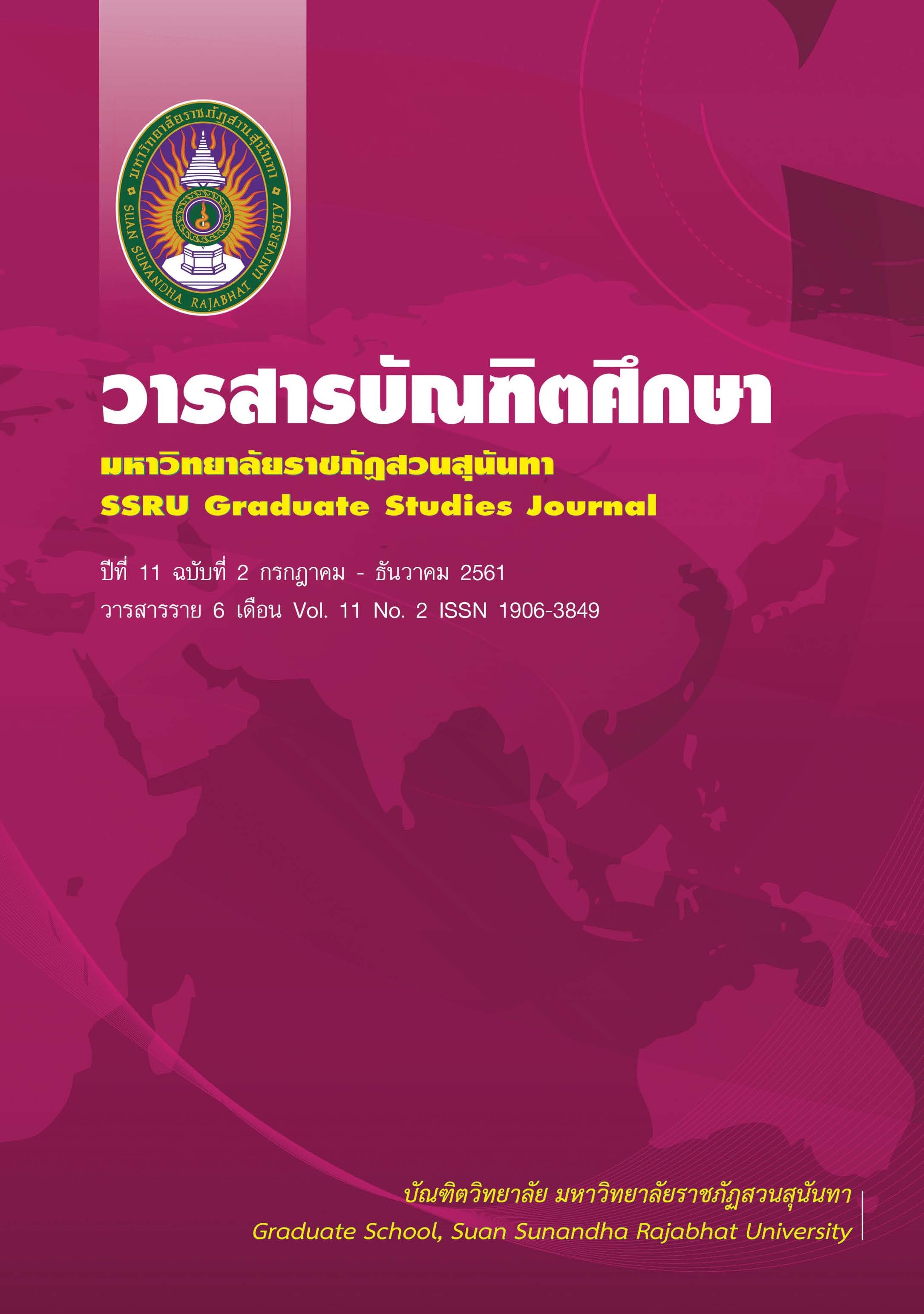ศักยภาพการรู้เท่าทันสื่อที่ส่งผลต่อการตระหนักรู้โฆษณา หลอกลวงในกลุ่มผลิตภัณฑ์เสริมอาหาร ในจังหวัดชลบุรี
Main Article Content
บทคัดย่อ
การวิจัยครั้งนี้มีวัตถุประสงค์ เพื่อศึกษาความแตกต่างด้านประชากรศาสตร์ต่อการตระหนักรู้โฆษณาหลอกลวงในกลุ่มผลิตภัณฑ์เสริมอาหาร และศึกษาระดับความรู้ในโฆษณาหลอกลวงรวมถึงทักษะการรู้เท่าทันสื่อ นอกจากนี้ยังศึกษาอิทธิพลของความรู้ในโฆษณาหลอกลวงและทักษะการรู้เท่าทันสื่อที่ส่งผลต่อการตระหนักรู้โฆษณาหลอกลวงในกลุ่มผลิตภัณฑ์เสริมอาหารกลุ่มตัวอย่างที่ใช้ในการวิจัย คือ ผู้บริโภคที่เคยรับชมโฆษณาผลิตภัณฑ์เสริมอาหาร จำนวน 400 คน ใช้การสุ่มตัวอย่างโดยไม่ใช้ทฤษฏีความน่าจะเป็น (Non-probability) และสถิติที่ใช้คือ ค่าเฉลี่ย ส่วนเบี่ยงเบนมาตรฐาน และสถิติเชิงอนุมานการวิเคราะห์ค่าความแปรปรวนทางเดียว (One-way ANOVA) ในการศึกษาระดับความรู้ในโฆษณาหลอกลวงและทักษะการรู้เท่าทันสื่อ รวมถึงใช้การวิเคราะห์ความสัมพันธ์ใช้สถิติสหสัมพันธ์ การวิเคราะห์สมการถดถอย การวิเคราะห์ความแตกต่าง ที่ระดับนัยสำคัญทางสถิติ 0.05 ในการศึกษาอิทธิพลความรู้ในโฆษณาหลอกลวงและทักษะการรู้เท่าทันสื่อที่มีผลต่อการตระหนักรู้โฆษณาหลอกลวงของผลิตภัณฑ์เสริมอาหาร
ผลการวิจัยพบว่า ด้านประชากรศาสตร์ผู้บริโภคส่วนใหญ่เป็นเพศหญิง คิดเป็นร้อยละ 82.20 มีอายุ 31-40 ปี คิดเป็นร้อยละ 52.30 มีการศึกษาระดับปริญญาตรี คิดเป็นร้อยละ 73.80 มีรายได้เฉลี่ยต่อเดือน 10,001-20,000 บาท คิดเป็นร้อยละ 53.50 และในด้านระดับความรู้ในโฆษณาหลอกลวงและทักษะการรู้เท่าทันสื่อรวมถึงอิทธิพลความรู้ในโฆษณาหลอกลวงและทักษะการรู้เท่าทันสื่อที่มีผลต่อการตระหนักรู้โฆษณาหลอกลวงของผลิตภัณฑ์เสริมอาหาร พบว่า ตัวแปรอิสระ 4 ตัวแปร คือ ทักษะการรับสื่อ ทักษะการเข้าใจสื่อ ทักษะการประเมินสื่อ และทักษะการใช้สื่อให้เกิดประโยชน์ที่ส่งผลกระทบต่อการตระหนักรู้โฆษณาหลอกลวงในกลุ่มผลิตภัณฑ์เสริมอาหาร ขณะที่ตัวแปร 2 ตัวแปร คือ ความรู้ในโฆษณาหลอกลวง และทักษะการวิเคราะห์สื่อ ไม่ส่งผลกระทบต่อตัวแปรตามอย่างมีนัยสำคัญทางสถิติ
Article Details
เอกสารอ้างอิง
กฤชณัท แสนทวี. (2553). พฤติกรรมการเปิดรับและระดับการรู้เท่าทันสื่อของเยาวชนในเขตกรุงเทพมหานคร. การค้นคว้าอิสระเภสัชศาสตรมหาบัณฑิต เทคโนโลยีการโฆษณาและการประชาสัมพันธ์, คณะเทคโนโลยีสื่อสารมวลชน มหาวิทยาลัยเทคโนโลยีราชมงคลพระนคร.
จุฑารัตน์ สมจริง. (2557). การรู้เท่าทันสื่อและสารสนเทศกับเยาวชนที่เนกลุ่มเสี่ยงในจังหวัดตรัง. การค้นคว้าอิสระศิลปศาสตรมหาบัณฑิต นิเทศศาสตร์และสารสนเทศ, คณะมนุษยศาสตร์มหาวิทยาลัยเกษตรศาสตร์.
จินตนา ตันสุวรรณนนท์. (2557). ความสัมพันธ์ระหว่างการรู้เท่าทันสื่อโฆษณากับพฤติกรรมบริโภคนิยมของเยาวชนในเขตกรุงเทพมหานคร. SDU Res., 11(1), 94-100.
ชนาทิป อ่อนหวาน. (2553). ความรู้ความเข้าใจและทัศนคติที่มีผลต่อแนวโน้มพฤติกรรมการซื้อสินค้าที่มีฉลากคาร์บอนของผู้บริโภค ในเขตกรุงเทพมหานคร. การค้นคว้าอิสระบริหารธุรกิจมหาบัณฑิต การตลาด, คณะสังคมศาสตร์ มหาวิทยาลัยศรีนครินทรวิโรฒ.
ณพล ผลากรกุล. (2559). ผลกระทบจากโฆษณาบนเฟซบุ๊ก และแนวทางการรู้เท่าทันสื่อโฆษณาบนเฟซบุ๊ก. Journal of Communication and Management NIDA, 2(1), 18-21.
ปาริฉัตร ตั้งพันธ์ประเสริฐ. (2550). ความรู้ความเข้าใจเกี่ยวกับองค์การ กับผลการปฏิบัติงานของพนักงาน: กรณีศึกษา พนักงานของบริษัท เธียรสุรัตน์ จำกัด. การค้นคว้าอิสระศิลปศาสตรมหาบัณฑิต จิตวิทยาอุตสาหกรรมและองค์การ, บัณฑิตวิทยาลัย สถาบันเทคโนโลยีพระจอมเกล้าพระนครเหนือ.
ปิยนุช สาที. (2559). คุณลักษณะการรู้เท่าทันสื่อของนักเรียนมัธยมศึกษาตอนต้นสังกัดสำนักงานเขตพื้นที่ การศึกษามัธยมศึกษา เขต 26. การค้นคว้าอิสระครุศาสตรมหาบัณฑิต วิจัยและประเมินผลการศึกษา, บัณฑิตวิทยาลัย มหาวิทยาลัยราชภัฏมหาสารคาม.
พรทิพย์ เย็นจะบก. (2556). การรู้เท่าทันสื่อบนสถานการณ์ความขัดแย้งทางการเมืองของประเทศไทย: กรณีศึกษาเฉพาะสื่อกระแสหลักและสื่อใหม่ ในช่วงเวลาหาเสียงเลือกตั้งปี พ.ศ. 2554. วารสารการประชุมทางวิชาการของมหาวิทยาลัยเกษตรศาสตร์, 51, 504-510.
สำนักงานสถิติจังหวัดชลบุรี. (2560). รายงานสถิติจังหวัดชลบุรี 2560. จาก http://chonburi.nso.go.th/index.php.
อดุลย์ เพียวรุ่งโรจน์. (2543). การศึกษาแนวคิดเพื่อกำหนดตัวแปรความรู้เท่าทันสื่อสำหรับการวิจัย สื่อสารมวลชน. ปริญญาวารสารศาสตรมหาบัณฑิต มหาวิทยาลัยธรรมศาสตร์.
อรอุษา สุวรรณมณี. (2555). การโฆษณาผลิตภัณฑ์สุขภาพที่อ้างสรรพคุณยาโดยผิดกฎหมายทางวิทยุท้องถิ่น. งานนิพนธ์เภสัชศาสตรมหาบัณฑิต เภสัชศาสตร์สังคมและการบริหาร, คณะเภสัชศาสตร์มหาวิทยาลัยสงขลานครินทร์.
Aditya, R. N. (2001). The psychology of deception in marketing: A conceptual framework for research and practice. Psychology & Marketing, 18(7), 735-761.
Bloom, B. S., Engelhart, M. D., Furst, E. J., Hill, W. H., & Krathwohl, D. R. (1984). Taxonomy of educational objectives: Handbook 1: Cognitive domain. New York: Longman.
Eristi, B., & Erdem, C. (2017). Development of a Media Literacy Skills Scale. Contemporary Educational Technology, 8(3), 249-267.


